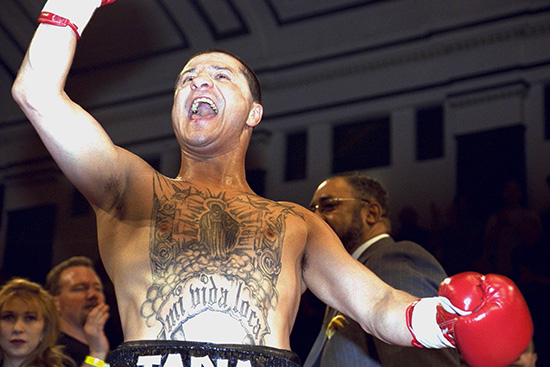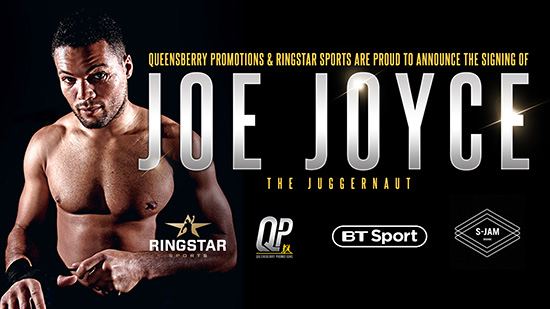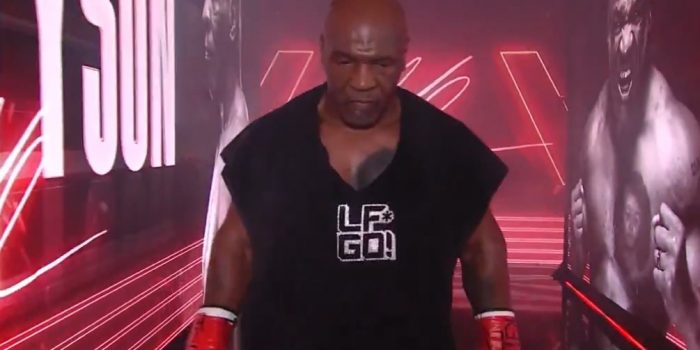By Alan Hubbard
Standing ovations normally are the preserve of mega-events like the Proms at the Royal Albert Hall. Rarely for pugilists at York Hall.
Yet should the 1,500 or so hard-core fight fans who will pack that cockpit of clout in London’s East End, surely the most atmospheric arena in the land, on Saturday, February 22 when Frank Warren stages a show that is a tasty hors d’oeuvre before second helping of that fistic feast in Las Vegas between Deontay Wilder and Tyson Fury, they may hear echoes from 20 years ago.
Then the York Hall crowd were on their feet applauding the token appearance in this country of a legendary American named Johnny Tapia, cheering him as he made his way both in and out of the ring after his rapid first round dismissal of Argentinian Eduardo Enrique Alvarez.
It was a rare tribute to a fighting man whose name remains familiar to those aficionados who follow and truly love of the sport, less so to the Jaeger Bomb- swilling Jack-the-Lads and their lasses who occupy the more expensive seats at some modern marquee happenings today.
If those attending Warren’s bill which features, among other tasty morsels, the British super bantamweight title rematch between Brad Foster and Lucien Reid, also keep their eyes peeled they might even see the Ghost of Johnny Tapia.
Which happens to be the title of a compelling new book on the complex life and tragic times of the little man from Albuquerque New Mexico who held five world titles from super fly through to featherweight.
For the York Hall faithful, arguably the most knowledgeable crowd in British boxing, just being in his presence on the night of 11 January 2002 was to appreciate that here was the master of his craft who had repeatedly overcome incredible vicissitudes battling against drugs and criminality to reach the pinnacle of his career, which he did three months months later, going from his brief appearance at Bethnal Green to topping the bill and winning the IBF featherweight belt at Madison Square Garden, much more his natural habitat alongside the glamourous casino venues in Las Vegas than the tiny, sweaty York Hall.
Sadly they were not to know that within a few years Tapia would crash back to earth, his chequered life inevitably ending tragically.
Tapia’s backstory is professionally pieced together with the assistance of his widow and latterly his manager Teresa by Paul Zanon who is that rarity, a photo journalist as competent with the camera as he is with the keyboard.
Boxing books, like boxers themselves, come in all shapes and sizes. My own bookshelves now creak under the combined weight of some 30 odd tomes on Muhammed Ali, the latest simply called Ali by being two inches thick and 623 pages long, to Zanon’s slim 57-page chronicle on Tapia which in essence is really an extended essay. Nonetheless an eminently readable and fascinating one.
Of course most boxers have a tale to tell but few are more graphic or movie-worthy than that of Johnny Tapia whose mother was kidnapped, raped and murdered when he was an eight-year-old kid. As a wild child teenager Tapia had problems dealing with that and resorted to drugs. At one time he attempted suicide and was even pronounced DOA (Dead on Arrival) five times at various hospitals following drug abuse before and during a pro career which lasted from 1988-2011 and saw him work his way through three different trainers, including Eddie Futch and Freddie Roach,
Tapia was an amazingly complete and skilled box-fighter and in his prime easily one of the best super-flyweights ever. He held multiple world championships in three weight classes, including the unified IBF and WBO super flyweight titles between 1994 and 1998, the unified WBA and WBO bantamweight titles between 1998 and 2000, and the IBF featherweight title in 2002. His 1999 loss by decision to Paulie Ayala was named the Fight of the Year by Ring Magazine.
His record was of 59 wins, 5 losses and 2 draws, with 30 wins by knockout.
Tapia had many tattoos around his body, the most prominent one reading: Mi Vida Loca (My Crazy Life), the nickname he adopted. Crazy indeed! While he was still addicted to drugs, Tapia built an amateur record of 150 wins and 12 losses. His professional career began on March 28, 1988 but it took an enormous step backwards when he was again found with drugs, and suspended from boxing for three years. He had to start over from scratch when he was finally able to return in 1994, becoming a two time world bantamweight champion. Tapia was arrested in Bullhead City, Arizona the night of January 10, 2003 for resisting arrest along with his cousin, who was wanted on charges in New Mexico. After his arrest, he returned to Las Vegas, and there, he slipped onto the floor, crashing his head against the concrete and had to be hospitalised in critical condition.
It was in 2012.a year after his retirement, that, as Zanon writes, Tapia’s demons finally defeated him and he died following a heart attack, aged just 45. His burial site, in home town Albuquerque is in the form of a boxing ring.
Three years ago he was inducted posthumously into boxing’s International Hall of Fame in Canastota New York. Accepting the award on her late husband’s behalf, Teresa Tapia was given a standing ovation.
Johnny would have appreciated that as much as the one he got at York Hall 20 years ago.
(The Ghost of Johnny Tapia by Paul Zanon is published by Hamilton Noir at £7.99).
Queensberry’s new signing, unbeaten welterweight Alex Bishop, features at York Hall on February 22 on the undercard of Brad Foster defending his British and Commonwealth super bantamweight titles in a rematch against the also unbeaten Lucien Reid. At super middleweight, unbeaten former Team GB amateur star Kody Davies (10-0) goes in with the popular ‘Top Boxer’ Umar Sadiq (9-1).
Also on the bill is thrilling super bantamweight prospect Dennis ‘The Menace’ McCann for his sixth professional assignment, Southampton snapper Ryan ‘The Piranha’ Garner (8-0) aiming to make a timely return and make up for lost time at super featherweight, as well as featherweight starlet Louie Lynn (5-0) from Banstead looking to build on his impressive Queensberry Promotions debut in December.
Top drawer former amateurs and now new professionals Henry Turner (super lightweight, 1-0), Eithan James (super lightweight, 2-0) and Sam Noakes (lightweight, 2-0) get to take the next step towards early title contention, while Muhammad Ali – elite amateur and 2016 Rio Olympian – makes his professional debut at bantamweight.









Recent Comments